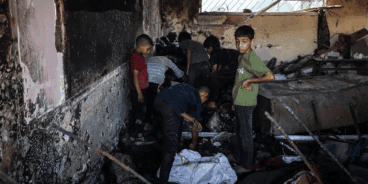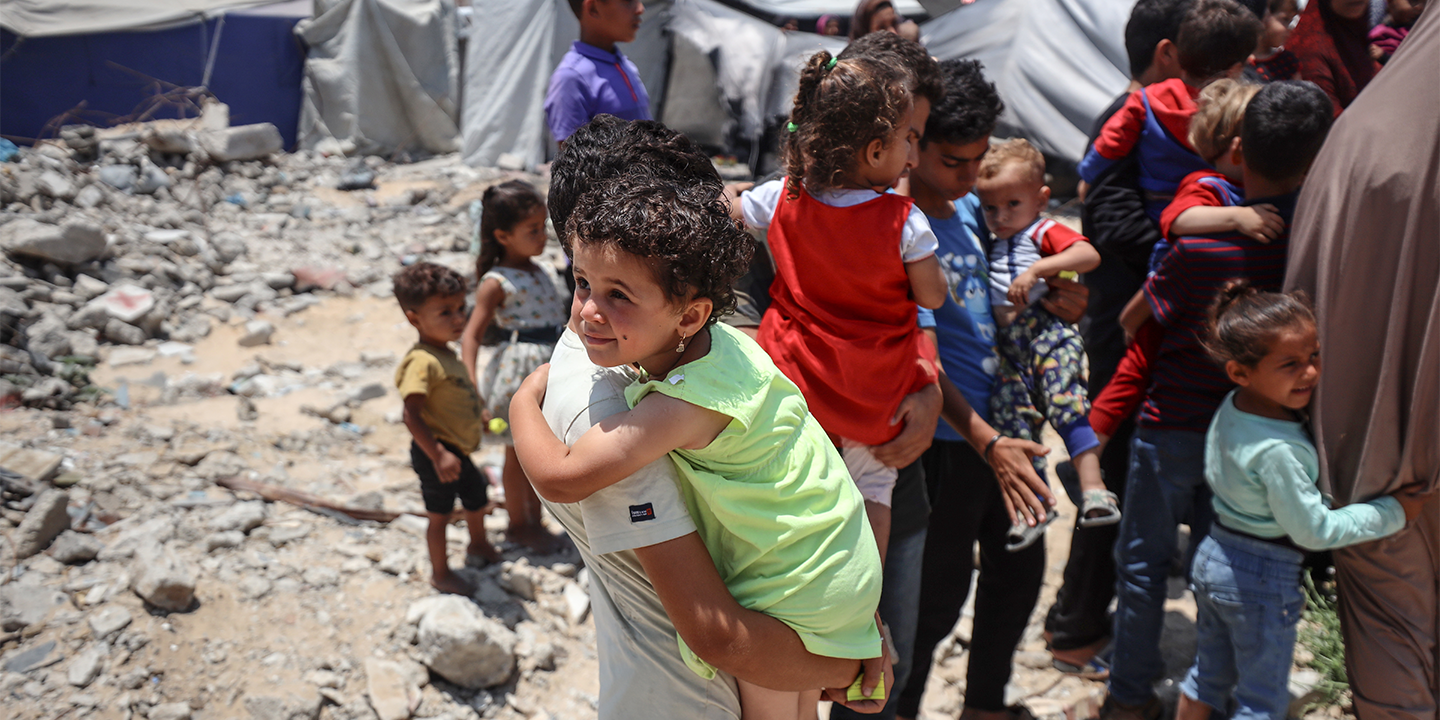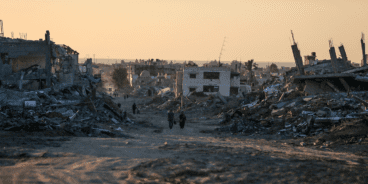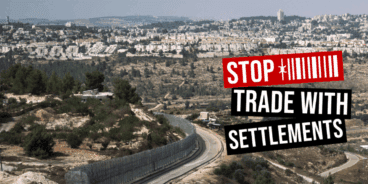

Atrocity Alert No. 442: Israel and the Occupied Palestinian Territory, Myanmar (Burma) and Belarus
Atrocity Alert is a weekly publication by the Global Centre for the Responsibility to Protect highlighting situations where populations are at risk of, or are enduring, mass atrocity crimes.
DOZENS KILLED SEEKING AID AS ISRAEL USES STARVATION AS A WEAPON OF GENOCIDE IN GAZA
Between 1-3 June dozens of Palestinians were killed and hundreds more injured after Israeli forces opened fire on residents attempting to access food aid distribution sites in Rafah and near the so-called Netzarim Corridor. The Red Cross Field Hospital in Rafah treated 179 victims, including women and children, on 1 June, the majority of whom suffered gunshot or shrapnel wounds. Twenty-one patients were declared dead on arrival. UN Secretary-General António Guterres condemned the attacks, calling for an “immediate and independent investigation” and for “perpetrators to be held accountable.”
This incident is the latest in a series of deadly attacks on Palestinians seeking aid near distribution sites established by the so-called “Gaza Humanitarian Foundation” a United States- and Israel-backed organization that bypasses the UN-led aid distribution system. Since the “humanitarian mechanism” began operating on 27 May, the Office of the UN High Commissioner for Human Rights (OHCHR) has documented daily incidents of violence against Palestinians in connection with the mechanism. Francesca Albanese, UN Special Rapporteur on the situation of human rights in the Occupied Palestinian Territory, condemned Israel for using the guise of humanitarian assistance to maintain control over Gaza, calling it a “deliberate strategy — aimed at masking atrocities.”
In her March 2024 report, “Anatomy of a Genocide,” Special Rapporteur Albanese details Israel’s strategic abuse of International Humanitarian Law (IHL) to provide “humanitarian camouflage” for the commission of international crimes and to legitimize genocidal violence in Gaza. Over a year later, Israel continues to use this distorted strategy, imposing a militarized aid scheme that contravenes humanitarian principles and its obligations as the Occupying Power to ensure and facilitate aid delivery at scale. Rather than facilitating the provision of humanitarian aid, this strategy legitimizes the weaponization of aid and the use of starvation as a method of warfare. OHCHR has stressed that Israel’s “weaponisation of food for civilians and restricting or preventing their access to other life sustaining services constitute a war crime and may constitute elements of other international crimes, including genocide.”
Only decisive international action can reverse the entrenched impunity that has enabled Israel’s ongoing genocide in Gaza, now in its 19th month. The international community must act collectively to bring an end to Israel’s atrocities in Gaza and prevent such crimes from becoming a dangerous precedent. States should participate in a diplomatic humanitarian convoy to pressure Israel to lift the siege and ensure safe delivery of aid into Gaza. States should also implement two-way arms embargoes, suspend all trade agreements and sanction Israeli officials.
MYANMAR JUNTA EXTENDS CEASEFIRE AMID CONTINUED ATTACKS ON CIVILIANS
On 3 June Myanmar’s (Burma) military junta extended its unilateral ceasefire until 30 June. The ceasefire was initially declared after earthquakes in March that killed 3,700 people. Despite the ceasefire, the junta continues to target civilians, including in earthquake-affected areas. On 12 May a junta airstrike on a school in Oe Htein Kwin, Sagaing State – near the epicenter of the earthquakes – killed at least 22 children and two teachers while students were sitting for exams. Such attacks on civilians and civilian infrastructure are prohibited under international law and may constitute war crimes.
Meanwhile, from 25 to 27 May the Association of Southeast Asian Nations (ASEAN) held its annual summit. In a nine-point statement released on 27 May, the bloc emphasized the need for a lasting ceasefire across Myanmar and reiterated its commitment to peace and for the unfettered delivery of humanitarian aid. The junta has routinely blocked and seized aid in response to both natural disasters and conflict. ASEAN – currently chaired by Malaysia – also discussed establishing a permanent envoy to Myanmar to replace the current rotating system tied to the annual chairmanship.
While greater regional engagement is welcome, ASEAN’s response to the crisis in Myanmar has been hampered by its noninterference policy and internal divisions. This inaction has enabled the junta to commit atrocities against civilians with impunity. A recent report by the activist group Justice for Myanmar revealed that 54 ASEAN-based companies maintain ties with the junta. On 24 May the group stated, “The significant involvement of ASEAN-based businesses and member governments in providing funds and aviation fuel to the military junta has been enabled by the bloc’s failure to press for a ban on aviation fuel and arms exports and action to stop revenue flows to the junta.”
The UN Special Rapporteur on the situation of human rights in Myanmar, Tom Andrews, has also highlighted ASEAN-linked companies in his reports to the Human Rights Council. Special Rapporteur Andrews said, “While calls to extend a non-existent ceasefire are well meaning, they will not stop the Myanmar military junta’s relentless attacks on civilians. Cutting off their supply of weapons and weapons materials will. For the people of Myanmar, action speaks louder than words.”
The Global Centre for the Responsibility to Protect echoes Special Rapporteur Andrew’s call for the international community to act and impose further sanctions on the junta, cutting off its means to perpetrate atrocities. As the UN Security Council remains deadlocked on Myanmar – and many international actors defer to ASEAN – it is long past time for regional leaders to find creative solutions to end the crisis and protect populations in Myanmar.
NEW UN EXPERT REPORT DETAILS WORSENING HUMAN RIGHTS CRISIS IN BELARUS
A new report by the UN Special Rapporteur on the situation of human rights in Belarus grimly details a protracted and deteriorating crisis. Five years after the contested 2020 presidential election and subsequent protests, populations in Belarus continue to face systematic patterns of repression marked by widespread fear, persecution and a complete crackdown on fundamental freedoms. Earlier this year, the UN Human Rights Council-mandated Group of Independent Experts on the Situation of Human Rights in Belarus concluded that the government’s continued use of arbitrary detention – often accompanied by torture or ill-treatment – and politically motivated persecution to silence dissent amount to crimes against humanity, specifically the crime of persecution on political grounds.
The Special Rapporteur emphasizes that “Belarus continues to live under the shadow of repression,” highlighting ongoing arrests and convictions on politically motivated charges, inhuman detention conditions and deliberate ill-treatment of detainees, particularly women, minors and the elderly. Lawyers defending these individuals face harassment, disbarment and arrest, leaving detainees without access to legal redress to fight their arbitrary detention. Although the Belarusian government announced on 9 May 2025 a general amnesty for vulnerable prisoners, none of those convicted in connection with the 2020 protests were released. According to the Viasna Human Rights Centre, more than 1,180 individuals remain detained or imprisoned on fabricated or politically motivated charges.
Belarusian authorities have reshaped the country’s legal system to eradicate all dissent under the guise of legality. So-called counterterrorism and anti-extremism laws are routinely misused against opposition politicians, human rights defenders, journalists and activists. Recent legal changes have also enabled discriminatory and repressive measures against LGBTQIA+ individuals. The Special Rapporteur also highlights an increase in transnational repression and collective punishment. Belarusians forced into exile since 2020 face politically motivated charges and in absentia trials lacking due process, while reprisals are increasingly targeting family members of individuals deemed disloyal by the authorities.
A particularly concerning trend is the use of coercive psychiatric treatment as punishment for dissent. At least 33 individuals, some as old as 77, have been subjected to compulsory psychiatric confinement, where they reportedly held incommunicado at psychiatric institutions without access to parole or judicial review. The UN Working Group on Arbitrary Detention has affirmed that involuntary psychiatric treatment for political expression constitutes a grave violation of international law.
These findings underscore the need for a sustained, coordinated international response. The Belarusian authorities must immediately release all individuals imprisoned on politically motivated charges, cease the practice of coercive psychiatric detention and respect the rights of Belarusians in exile and their families. The international community must provide assistance and protection to Belarusian civil society actors, journalists and exiled individuals at risk.
Related Content


Urgent Call to Action: International Community Must Uphold the Responsibility to Protect the Palestinian People
